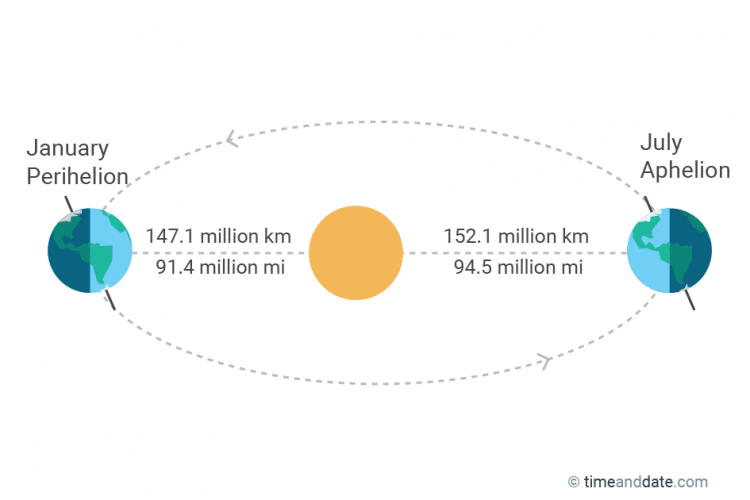Misconceptions About Seasons
One of the most commonly spread misconceptions about the change of seasons relates to the mistaken opinion that seasons occur because of the Earth’s distance from the Sun. What is interesting is that people of all ages make the same mistake. Because many think that the temperature on the Earth fluctuates depending on its distance from the Sun, it is presumed that seasons change because of such a change in distance. However, in reality, the distance from the Earth to the Sun does not change because the orbit is almost a perfect circle with the smallest difference of two percent between the closest and the farthest points (Lambert & Sundburg, 2010).
Reason for Seasons
The real explanation for why there are four seasons on the Earth is the fact that the planet’s axis is not straight and is titled to one side. Therefore, the Earth rotates on its axis and rotates around the sun, while the planet’s axis always points to one direction. It is also important to remember that the Earth has a Southern and a Northern Hemispheres. Thus, in winter (December) the Sun shines straight on the Southern Hemisphere while in summer (June) the Sun shines directly at the Northern Hemisphere.
Seasons on Other Planets
Apart from the Earth, three other planets, namely Neptune, Mars, and Saturn also have an approximate twenty-degrees tilt, and, similar to our planet, also have different seasons. However, because they are farther from the Sun, warm seasons are much colder and much longer there. According to Nelson (2005), summers on Mars are twice as long as on the Earth; summer is forty years on Neptune and seven years on Saturn.
On the other hand, there are planets such as Jupiter, Venus, and Mercury, which have almost no tilt, and therefore, cannot experience the changing of the seasons. Among these planets, it is worth to mention Venus that has a tilt of 177.4 degrees, which means that it is located almost upside down in comparison with other planets. Moreover, the atmosphere of Venus, which is very high in carbon dioxide, also contributes to the fact that there is no change of seasons on the planet since the average temperature on Venus is twice as hot as the maximum setting in the regular kitchen oven. Lastly, there is no specific place on the planet where the heat can escape at any time of day (Maness, 2006).
Contrast to the environment on Venus, Mercury manages to capture much more sunlight and has a much thinner atmosphere, which can let out some heat. Also, the planet’s orbit is not a perfect circle; thus Mercury experiences more heat in those instances when it is closer to the Sun (Nelson, 2005).
The Oddest Planets
It is commonly said that Pluto and Uranus are the oddest planets in our solar systems. For example, the tilt of Uranus is ninety degrees and is lined up with its orbital plane. Thus, when the planet makes its way around the Sun, one of its poles is pointed directly at the Sun while another is pointed directly away. This means that half of the way around the Sun one hemisphere of Uranus is in complete darkness while another is exposed to the Sun. Pluto is very far away from the Sun, and therefore, there is no possibility of seasonal change.
Despite this, the planet’s orbit is the least circular in comparison to other planets, and during its ‘traveling’ around the Sun, Pluto is exposed to three times as much solar energy when it is at its closest to the Sun compared to when it is at its most distant position (Nelson, 2005).
Aphelion and Perihelion
When exploring the question of why the Earth has seasons, it is important to mention the notions of perihelion and aphelion. They refer to the distance from a planet to a star and are opposite in their meanings. While aphelion refers to the farthest point in the orbit where the body is the farthest from the star, the perihelion refers to the nearest point on the orbit. The image below (Figure 1) illustrates these two notions:

As to the relationship between aphelion, perihelion, and the Earth, our planet is located closest to the Sun in winter in the northern hemisphere, which indicates its perihelion. On the other hand, in summer, the southern hemisphere is closer to the Sun, which indicates its aphelion. Furthermore, in perihelion, the distance between the Earth and the Sun constitutes 147.1 million kilometers while in aphelion this distance increases to 152.1 million kilometers, as shown in Figure 1.
Thus, there is quite a simple explanation as to why the Earth has seasons, and it is far from the commonly spread misconceptions. It is not the distance to the Sun, which influences the changing of seasons, but the fact that the Earth has a tilt.
References
Lambert, J., & Sundburg, S. (2010). The reasons for the seasons. Science and Children, 47(8), 68-70.
Maness, D. (2006). Earth seasons don’t fit other planets. Web.
Nelson, G. (2005). Science 101: Do other planets have summer? Science and Children, 42(8), 44-45.
Perihelion and aphelion. (n.d.). Web.